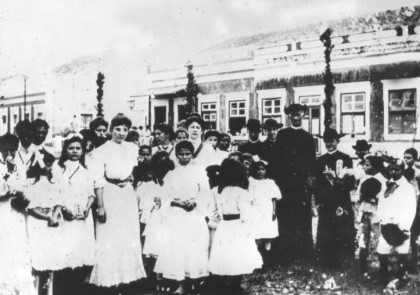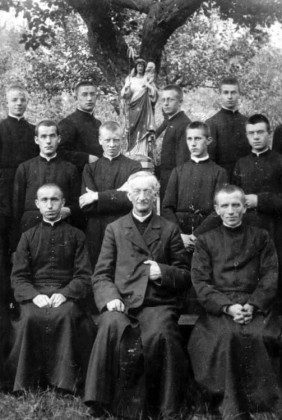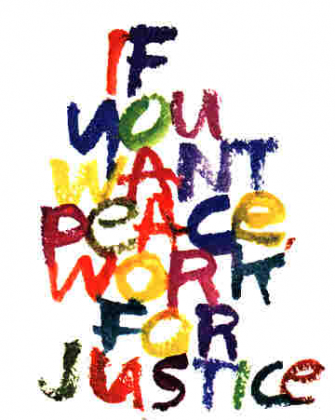“Following the Founder, according to the signs of the times and in communion with the life of the Church, we want to contribute to establishing the reign of justice and Christian charity in the world.”
SCJ Rule of Life, No. 32
Fr. Dehon and “The Social Question” (Part 1)
Reflections from the Justice, Peace and Reconciliation Office
We don’t seem to use the phrase “the social question” anymore, which is telling. Apparently there’s no longer any question that the Church should be concerned about social issues and the social life of society, nations, and the world – though there is certainly no agreement about what she should do about it.In Leo Dehon’s day, the social question was huge and much debated, for many reasons.
All of France was traumatized by political turmoil in the wake of the French Revolution, and the working class was further stressed by the ongoing Industrial Revolution. Within the Church, there were many who felt that society needed to go back to, if not monarchy (though many were royalists), a policy in which the Church had more influence and control over society. A Cardinal at the time spoke of their “profound conviction that politics is completely powerless to heal the ills of the country” and insisted “the causes of these ills are moral and religious.” To the pauperized [1] working class, these churchmen offered the hope of Heaven but not much else.

Leo Dehon, a son of privilege, came of age during what his biographer Giuseppe Manzoni calls “the long imperial celebration” of Napoleon III, which resulted in an eighteen year “strange marriage between the church and the corrupt materialistic empire.” Ascendant in church leadership were absolutists, who wanted to use force to combat error. Yet there were also voices that argued for democracy, rejecting alliances with the powers that be, and freedom of conscience. Dehon himself was not won over to the side of democracy until he read Pope Leo XIII’s famous encyclical Rerum Novarum (On the Rights and Duties of Capital and Labor).
Republicans [2] regained power just before Dehon came to his first parish, and anti-clericalism, and even persecution of the church, became common into the next century. A triumphalistic Church that was allied with the rich and powerful had become a persecuted sect in a radically secular society. It was at this moment that the recently ordained Fr. Dehon came to his first parish.
Six weeks after arriving in the city of Saint Quentin [3] in 1871, he gave a Christmas sermon that showed that despite his upbringing and conservative politics, he was not blind to the plight of the worker in the factories:
Godless capitalists are exploiting the worker and are destroying his body, his soul, and his eternity… often without giving him an adequate share of the profits earned by his sweat…. This society is rotten and all the workers’ claims are well-founded. The current regime is evil, unjust, and a menace to society.
Fr. Andre Perroux, SCJ,explains that after “a somewhat sheltered life” prior to this assignment,
he [Dehon] lived in close proximity to the harsh conditions of the workers, especially those in the textile industry: for starvation wages a man worked on average 14 hours a day, a woman worked almost as long, and children as young as six years old worked 12 to 13 hours for even less pay. Father Dehon denounced this exploitation and the absolutely inhumane working conditions which were creating a wider gulf between the classes.
The inadequacy of the official Church response to this significant challenge pained him deeply: ‘A mistaken pastoral approach is hindering the progress of the Church.’ He was keenly aware of the shortcomings of a purely ‘moral’ approach which consisted of telling people to accept their fate or fulfill their obligations or increase their charitable donations.
He was incapable of shrugging his shoulders or folding his arms in the face of the suffering and injustice that oppressed the poor or the ill-considered policies which led to disastrous consequences. With eyes wide open, he analyzed and assessed situations and, without counting the personal cost, he got involved.
In his first six months, Fr. Perroux says, “He gave his whole heart and much of his time to getting to know people through personal contact….” He “gladly” followed the admonition of noted French ecclesiastic Bishop Dupanloup:
If I had one piece of advice to give to Christians and priests of our day, it would be not to remain strangers to social questions, as has so often been the case. Get involved in the lives of farmers and workers, learn about their living conditions, their food, their salaries, their children and the elderly, their mutual aid societies, what they read and what they do in their spare time. Why? My God, in order to care for them, to instruct them, and to improve their circumstances!
As Dehon came to know people and their situation, he came to believe it “essential that the Church knows how to show that it is not only capable of forming pious souls, but also of bringing about the triumph of social justice that people long for.”

Fr. Luigi Morello, SCJ, in his introduction to Fr. Dehon’s social writings, concludes that “the talent of Fr. Dehon lay in his ability to persuade and organize. In his life, in his initiatives and writings, we see the great social and political openings of French Catholicism maturing and progressively developing at the end of the 19th century.” We see him doing this in his Youth Clubs, Workers Circles, Social Congresses, and many journalistic enterprises.
In 1877, Fr. Dehon asked permission to found a religious congregation. Fr. Morello notes that
the social aspect was absent from the original plan for [Dehon’s) foundation [but] after a year of reflection, he believed that this aspect could very well be taken up by the constitutions of his congregation. He discovered and was able to penetrate the deep significance of the Gospel term, Kingdom of God. These words sum up very well his spirituality of interior liberation based on the love of Christ. Thus was born the idea of a social journal. Thus began his activity as a writer which would necessarily put him in contact with the entire social and democratic movement of Catholics.
About those early writings, he adds:
There is a rather spiritualist concept of life and society which emerges from the first articles… correct and true, but insufficient for understanding the real processes which determine social and political behavior. These too general principles, though solidly based, can easily have various meanings attached to them and can be reduced to ineffectiveness by the dominant ideologies.
… It is a vision of society which is too schematic and intellectual, reducing everything to a battle of two elites, the one good and the other evil, with each wanting to lead and direct society. [It] runs the risk of forgetting the real society, the majority of human beings who live with us every day. One forgets the common realities, which are also the truest and broadest. In particular, there is little respect for the dynamism and upward struggle of the people, for the culture of the largest strata of the population who, ultimately, form authentic society.
Then in 1891, when Dehon was 48, Pope Leo XIII issued Rerum Novarum, and Dehon found his guidepost and inspiration for his social writings for the next twelve years.
FOOTNOTES:
[1] P.J. Maguire notes in “The Rise of Social Catholicism in the 19th Century” that “pauperism” is a specific type of poverty: a “systemic condition in which working men and women are no longer able to maintain the minimal requirements that are essential for human survival.” [2] Supporters of democracy, not to be confused with the US political party. [3] The largest city of the district of Aisne in the Picardy region of northern France, and heavily industrialized.Comments or questions? Click here to contact Mark Peters, province director of Justice, Peace and Reconciliation



